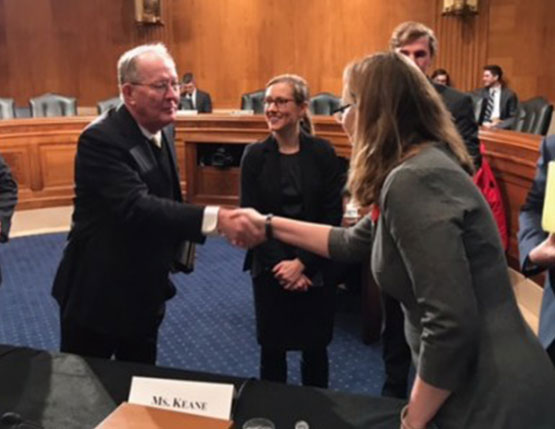Blogs
uAspire Testifies Before U.S. Senate Education Committee on College Affordability
January 18, 2018

Hearing on bill to reauthorize U.S. Higher Education Act focused on simplifying the financial aid process
For Immediate Release:
January 18, 2018
Media Contact:
Communications Director Jason B. Johnson
Ph: 781-971-1461; email: jasonj@uaspire.org
WASHINGTON, DC — uAspire Chief Policy Officer Laura Keane speaking before a hearing of the U.S. Senate Health, Education, Labor & Pensions Committee on Thursday warned that the process for obtaining federal financial aid is too complicated and all too often serves as a barrier keeping students from reaching their goal of a college degree.
In testimony today before the full Committee of the U.S. Senate for Health, Education, Labor & Pensions on reauthorizing the Higher Education Act, Keane and other experts highlighted the challenges hundreds of thousands of students face in paying for a college education. uAspire is a national nonprofit hyper-focused on the issue of college affordability and helping students find an affordable pathway to a college degree. Many students, parents, financial aid experts and policymakers are worried about the student loan debt crisis, Thursday’s hearing focused on ways to make the financial aid process simpler and more transparent.
“Choosing to attend and pay for college is an investment in one’s future. Millions of students make this decision every year. Yet, just 55% of those who start college, finish. A major reason for this, is that college costs aren’t transparent,” Keane told the committee.
Keane noted that uAspire, has held over 10,000 award letter conversations with our students, and collected over 50,000 letters. She said the Cost of Attendance is often incomplete, or missing altogether from notification documents.
“One-third of the letters we analyzed don’t list ANY cost at all. There is literally NO price tag. One-third of the letters mention only ‘direct costs’ – what is needed to pay the school to enroll,” Keane said. “And only one-third of these letters did what we believe they should, which is to include both direct costs and the ‘indirect expenses’ like books and transportation.”
Keane also noted that the formatting and terminology used in the award letters is inconsistent between institutions and confusing for students, citing that grant aid and loans are often lumped together, making it unclear what is gift aid and what loan aid must be paid back.
Committee Chairman Senator Lamar Alexander (R-TN) cited Ms. Keane and uAspire’s findings in calling for consensus in crafting “simpler, more effective regulations to make it easier for students to pay for college and to pay back their loans.”
“Something we have heard over and over from students, parents, and administrators – is that the federal financial aid form itself is overly complicated and needs to be much simpler,” Senator Alexander added.
Committee Ranking Member Senator Patty Murray (D-WA) said the complex financial aid process is hindering the federal government’s efforts to help students go to college.
“The purpose of our financial aid process is to help open the doors of education,” Senator Murray said. “Navigating our complex financial aid system can be overwhelming.”
Keane also shared the story of a student whose pursuit of a college degree was hampered by the complicated financial aid process.
“Let me tell you about Ella. Ella was granted a state-school scholarship that covered her tuition, fees, room and board. Her award letter showed no further costs. Ella’s family was elated! Her father had passed away, and this was his alma mater. Her mother worked tirelessly as a social worker, so funds were tight,” Keane said. “Once on campus, Ella realized how expensive textbooks were. Although she worked, she didn’t have enough money to buy them, and her grades suffered. When her GPA fell below a 3.0, she lost her aid and was forced to drop out. Now she has debt and no degree.”
uAspire advises over 10,000 high school and college students annually in Massachusetts and the Bay Area of California to find an affordable pathway to a college degree. In addition, they provide training to more than 2,000 front-line counselors and other practitioners in an additional 27 states so they can do the same with their students. uAspire’s financial aid award letter work in partnership with New America is made possible by the support of the ECMC Foundation, the Kresge Foundation and the Jack Kent Cooke Foundation.
###